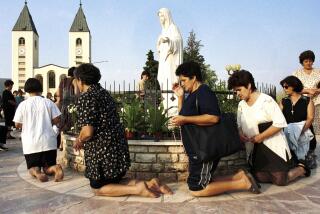Letters: Digging deeper into miracles
Re âThe trouble with miracles,â Opinion, July 8
Noting the dearth of miracles reported at Lourdes, France, Lawrence M. Krauss appears to make several assumptions. In a nutshell, he is saying that the number of miracles reported at Lourdes and recognized by the Roman Catholic Church as legitimate is solid evidence â almost proof â that miracles do not occur.
One thing we do know is that if a single miracle occurred at Lourdes, Krauss would be proved wrong.
Another assumption Krauss appears to be making is that God is some kind of spiritual gum machine: You put something in and something comes out. If true, that would betray an incredible ignorance of the church or its thinking on the subject.
One wonders if Krauss would recognize a miracle if one sat down and bit him on the ankle.
Nathan Post
Santa Barbara
Krauss notes that when scientists have a new idea, they âtry to prove it wrong as well as right.â Until fairly recently, the same was true of the Catholic Church when it tried to determine the veracity of miracles.
When considering canonization, the church employed a âdevilâs advocate,â whose task it was to try to refute the validity of an alleged miracle.
The devilâs advocate was established in 1587 but abolished in 1983 by Pope John Paul II. Whether coincidence or the direct result of this abolition, since 1983 there has been a dramatic increase in the number of saints.
David Macaray
Rowland Heights
How telling that on consecutive days, The Times reports on the Catholic Churchâs systematic cover-ups of its clergyâs sexual abuses and then runs an Op-Ed piece criticizing the churchâs implausible findings of miracles.
Maybe such claims of miracles performed by former popes or in Lourdesâ waters would be deemed more credible if the church first managed to work a universally indisputable miracle. It would be truly miraculous for the church to rectify oversight of its clergy, so that all future sex-abuse cases are promptly reported to the police for investigation and prosecution. Offenders found guilty would be defrocked.
Gene Martinez
Orcutt, Calif.
ALSO:
Letters: Democracy and Prop. 8
Letters: Online educationâs place
More to Read
A cure for the common opinion
Get thought-provoking perspectives with our weekly newsletter.
You may occasionally receive promotional content from the Los Angeles Times.










